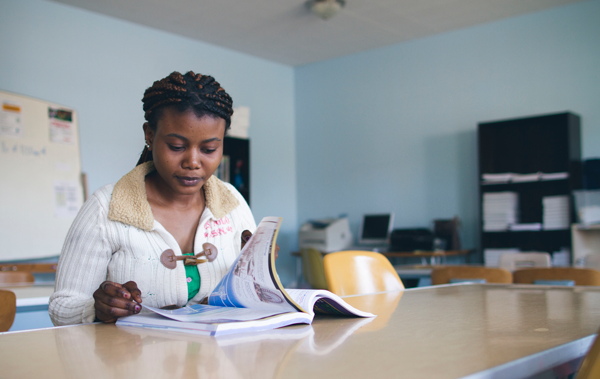Learning in Lansing
High school completion program helps refugees of all ages earn their diplomas

This post is part of the #CF100 Series of blog posts. The Council on Foundations is marking the 100th anniversary of the nation’s first community foundation, The Cleveland Foundation, by highlighting the roles of community foundations with this series.
See where it all began at our
Fall Conference for Community Foundations in Cleveland this October!

Many refugee youth who come to Lansing arrive as older teens. They often don’t have enough time to earn all of the credits needed to graduate from high school, regardless of educational history or even English-language fluency. Students age out of the public school system at 20, with or without a diploma.
Lansing Community College, St. Vincent Catholic Charities, Lutheran Social Services of Michigan, teachers and foster parents of refugee youth worked together to determine how to address this problem. They saw first-hand the negative impact the lack of a diploma was having on the students. First and foremost, lack of an accredited high school diploma made students ineligible to receive financial aid for continuing education, which meant no college degree, which meant limited job prospects.

Photo Credit: Eat Pomegranate Photography
In December 2010, the Global Institute of Lansing welcomed its first class.
GIL is the only organization in mid-Michigan that enables these refugee and immigrant students to earn accredited diplomas. Although accredited GED programs exist in the community, the GED tests tend to be insurmountable for English language learners.
“It’s a neat group of people to work with,” said Paula Frantz, program administrator for GIL. “They’re so grateful for the opportunity and they’ve really become family here. Seeing the different cultures come together is also kind of unique.”
Students enrolled at GIL are from Nepal, Iraq, Somalia, Sudan, Bhutan, Liberia, Guatemala, Congo, Vietnam and Mexico. They’ve had students in past years from about a dozen other countries, including Tanzania and Afghanistan.
“They all become such good friends and they help each other out,” Frantz said.
The program provides the students with teachers, tutors, classroom time and computers. It’s open from 10 a.m. to 2 p.m. weekdays in the First Presbyterian Church of Lansing. Students come and go as their schedules permit.
“Many of them are working and have family commitments, so they go through the program at their own pace,” Frantz said.
Each June, GIL holds a graduation ceremony. Michigan State University donates caps and gowns, and GIL buys tassels for the students to keep. June 2014 marked the fourth graduating class; 42 students have completed the program so far.
“The $15,000 grant we received from the Capital Region Community Foundation enabled us to enroll 22 new students this past academic year,” Frantz said. “It was our largest class since we opened. We were also able to purchase some supplies for the classroom, which is huge. So often we’re buying things out of our own pockets.
“We’ve never had to turn a student away,” she said. “Our dream someday is to become our own private school.”
Robin Miner-Swartz is Vice-President of Communications at the Capital Region Community Foundation.



